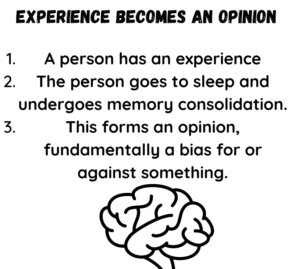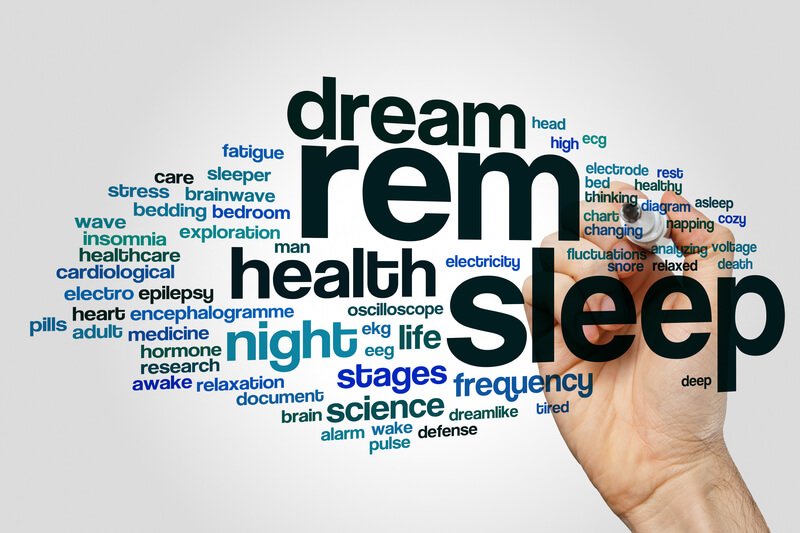Memory consolidation is a key biochemical and biomechanical process in forming the ideas by which you live your life.
An idea takes an interesting path through sleep toward ultimate expression.
Sleep is essential for memory consolidation, the process by which the brain transfers short-term memories into long-term memories.
In memory consolidation, the brain undergoes structural and chemical changes. While you sleep, your brain fortifies connections between neurons.
Research is still being performed to fortify our understanding of this process.
Memories come from experiences. These memories form the basis of opinions.
An experience forms a memory.
The memory is consolidated while the person sleeps.
The consolidated memory forms the basis for an opinion.
The opinion forms the basis for a bias either toward or against something.
While biases have a bad name, they’re not always bad. They’re a kind of a shorthand that makes decisions quick.
You should be aware of your biases.
Is bias always bad?
It’s bad when it’s against individuals for factors over which they have no control.
Bias also isn’t good when you miss important details in a situation because you’re giving a knee-jerk response.
Bias can be expressed in good fun, as with rivalries between friends around cities and sports.
Bias can be tragic, too, as in the case of when countries express it at war. It causes the warring parties to miss the humanity of the other side, which might offer opportunities to end the conflict earlier.
Ultimately, it’s a mixed bag. Bias can enable quick decisions, which can help keep one alive.
Prejudice is complicated as anything that’s wide-ranging, based on experience and assumption.
No matter your skin color, no matter your sex, no matter where you were born, by the time you reach your thirties and have dealt with the members of some group that’s different than you in at least one way, you’ll have experienced (or suspect you’ve experienced) prejudice at least once. Somebody, somewhere, who you’ve run across, will have some negative opinion about you based on some factor that you can’t control.
You can’t help what race you were born into. You can’t help what sex you are. You can’t have helped where you were born. It was all a matter of chance.
The other guy also has had the same experience.
Bias affects everyone in some way.
Memory consolidation
The only way you’ll be aware of how you’ve been consolidating memories and experiences is if you keep a dream journal.
You can come up with some of the same material through meditation, but that’s less efficient than dream journaling because meditators still need to sleep. Furthermore, they’re actually meditating and not sleeping so they’re having an alternate experience that’s not necessarily consolidating memories.
Your subconscious dreamlife isn’t always coming to earth-shaking revelations.

That doesn’t mean that they’re not any less important to how you see the world.
My memories were consolidating this week into opinions about how it was important for my children to have good relationships with their significant others.
Of course, because that’s a source of happiness for people when that aspect of life is going right.
Top-down regulation in the workplace is often out of touch and creates strife.
I want everyone to get along.
Predictability tears apart some couples because of a lack of creative expression. The members of the couple don’t feel like they’ve got the room to be creative.
You and I can’t directly control other people. They still have free will.
What we can control is our reaction to them. We’re going to be better at it if we’re aware of why we’re reacting and what we’re thinking about. Various experiences and thoughts form these principles, and we’re only going to be aware of them by keeping a dream journal.
For further reading:
Never let yourself become sleep deprived
Should you journal a dream when your sleep has been interrupted?
James Cobb RN, MSN, is an emergency department nurse and the founder of the Dream Recovery System. His goal is to provide his readers with simple, actionable ways to improve their health and maximize their quality of life.
We use some affiliate links and get a small commission if you click on a link and make a purchase. This agreement has no effect on our opinions.
